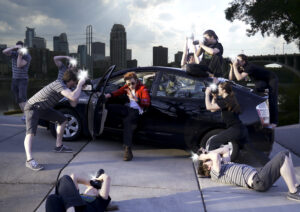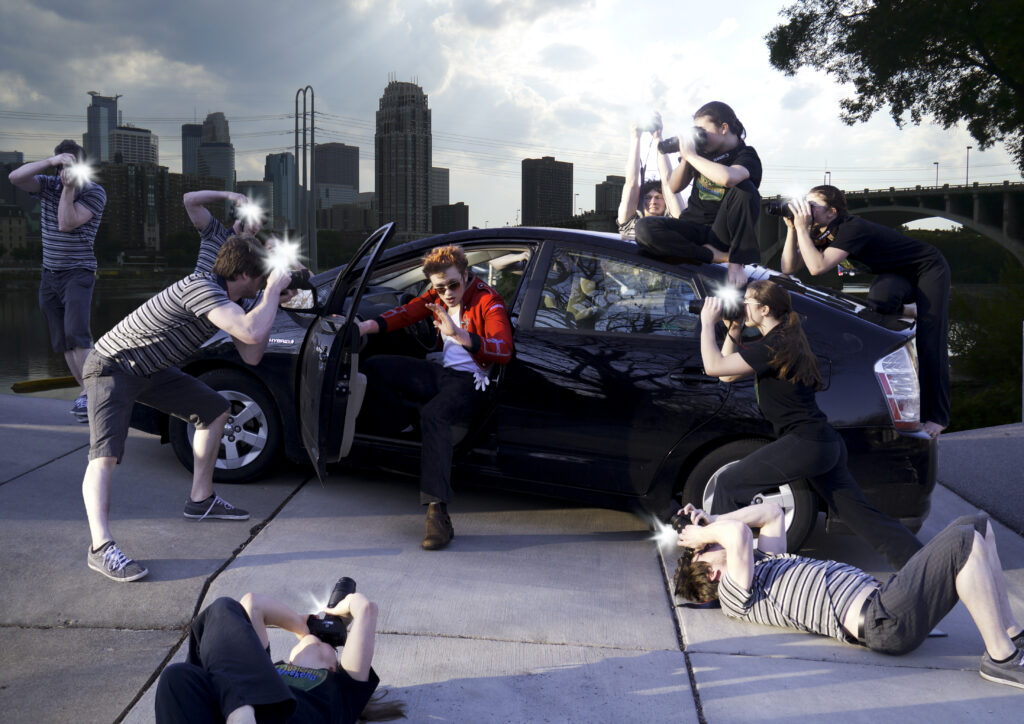By Carli Berasi
Lurking behind bushes,[1] skulking behind trash,[2] and prowling under cars,[3] paparazzi spend their days behind the camera, seeking optimal, exclusive angles of their incredibly photogenic subjects: celebrities.[4] Celebrities, who are often fiercely protective of their privacy, lose more than just their solitude, anonymity, and secrecy by their public figure status being subject to commercial photography—they also lose the rights to the images of themselves.[5] The Right of Publicity, a state-established law, affords citizens the protection against “misappropriation of a person’s name, likeness, or other indicia of personal identity—such as nickname, pseudonym, voice, signature, likeness, or photograph—for commercial benefit.”[6] This right is particularly significant in Hollywood, as celebrities monetize their image and likeness for their own personal gain, marketing, and exposure.[7] While one might assume this would preclude paparazzi—and others seeking to take and sell celebrity images—from capitalizing upon well-timed snapshots of the rich and famous, there is a loophole.
Copyright is a form of intellectual property, which is protected under federal law.[8] Intellectual property law has its roots in the Constitution, as Article I Section 8 confers the right to Congress “[t]o promote the Progress of Science and useful Arts, by securing for limited Times to Authors and Investors the exclusive Right to their respective Writings and Discoveries.”[9] Congress memorialized this power in 17 U.S.C. § 102, which provides protection for “original works of authorship fixed in any tangible medium of expression . . . includ[ing] . . . (5) pictorial, graphic, and sculptural works.”[10]
In California, home to Hollywood where famous actors, musicians, and public personalities reside, work, and socialize, the Right of Publicity as it relates to copyright law is particularly relevant. The law prohibits the “‘knowing’ use of a person’s name/likeness/etc., ‘on or in products, merchandise, or goods, or for purposes of advertising or selling . . . without such person’s prior consent.’”[11] Notably, there is a significant exception, as parties are allowed to engage in the aforementioned conduct, so long as it is “in connection with any news, public affairs, or sports broadcast or account, or in any political campaign.”[12] This loophole allows paparazzi to capitalize on taking celebrity pictures, as not only can they take the images and sell them for commercial gain under the guise that such images constitute “news,” but photographic work is explicitly covered by the copyright protection statute.[13] As such, it is ultimately the paparazzi, as compared to celebrities themselves, who own and have the commercial rights to these images.
This tension between the right to a person’s image, and the ownership of such images by others under copyright law, has become increasingly relevant with the rise of social media.[14] An increasing onslaught of lawsuits are being filed and litigated[15] as celebrities post paparazzi pictures of themselves on Instagram, posing licensing concerns.[16] By posting these images of themselves, even if they are as minor as a picture of them leaving the grocery store or on a run, celebrities are technically infringing upon the paparazzi’s copyright,[17] as to post these photos lawfully they would need to have express permission or have negotiated a licensing deal.[18] Paparazzi will often sue to recover some of the lost prospective proceeds,[19] because celebrities posting these photos minimize the commercial value of the images on the open market,[20] since social media allows for dissemination of information and interaction with fans instantaneously. With photo opportunities having decreased during COVID especially,[21] this poses a significant risk to paparazzi’s earning potential.
Justin Bieber, Katy Perry, and Emily Ratajowski are but a few of the celebrities who have been sued for posting photos of themselves to their social media, and generally the resolution of these suits is “an out-of-court settlement.”[22] While settling may seem like the most equitable option for both parties within the scope of the law—enabling the famous subject to post the photo and the artist behind the lens to receive compensation—for some celebrities the pandemic has heightened the stakes to an untenable point at which settlement is not as palatable of an option.[23] Lisa Rinna, a soap opera and reality star, was sued by a Backgrid, a “celebrity-photograph agenc[y],” which operates by licensing paparazzi-taken photographs to “top-tier” outlets including “People Magazine, Huffington Post, [and] the Daily Mail.“[24] Backgrid sued Rinna for $1.2 million, alleging copyright infringement over Rinna’s posting of photographs taken by Backgrid “of herself and her two adult daughters.”[25]
Rather than immediately settle, Rinna has offered a variety of unique affirmative defenses that could potentially alter the landscape of paparazzi copyrights, licenses, and social media postings. In her First Affirmative Defense, Rinna asserts that paparazzi “ha[ve] effectively ‘weaponized’ the Copyright Act,” thus having unclean hands, because they file for copyright protection of celebrity paparazzi photographs, then employ services that scour the internet for celebrities posting copyrighted images of themselves that they obtained from the open internet.[26] Further, Rinna contends that paparazzi and celebrity photo licensing companies’ practice of “hound[ing] celebrities in public (or at times in private locations), in order to profit off of their likeness, and then turn[ing] around and su[ing] those same celebrities for posting their own images on social media, is anathema to what the Copyright Act is intended to protect.”[27] In her Fifth Affirmative Defense, Rinna also asserts that since the photographs are of herself, and the economic value these companies derive from her photographs are because of her celebrity status (which is due to her “hard work, dedication to her craft and resultant success”), she should have an implied license to be able to utilize the photographs herself.[28] Lastly, Rinna contends that because she provides “commentary” along with the photographs this is a “transformative use,” and therefore qualifies under the “’fair use’ doctrine.”[29]
As her case proceeds to trial, Rinna’s defense provides some interesting legal questions to be addressed by the court.[30] The implications of the lawsuit upon the celebrity-photography business are substantial—if celebrities can work around the licensing requirement for the paparazzi photos using any of Rinna’s theories, paparazzi could potentially suffer a huge loss of income as social media flourishes. In particular, celebrities could be contacted directly by paparazzi to purchase the photos, rather than paparazzi licensing the photographs to celebrity-photography companies and news publications, as the instantaneous nature of social media would render going through a middle-man unnecessary, leading to a massive economic and content-focused impact upon the tabloid industry.
[1] Lisa Ryan, Olivia Wilde Has No Time for Creepy Paparazzi Hiding in Bushes, Cut (Oct. 7, 2016), https://www.thecut.com/2016/10/olivia-wilde-has-no-time-for-paparazzi-hiding-in-bushes.html.
[2] Edward Robinson, The Dirty Secrets of the Paparazzi, Wash. Post (July 12, 1992), https://www.washingtonpost.com/archive/lifestyle/style/1992/07/12/the-dirty-secrets-of-the-paparazzi/75556429-f5dc-4a55-99f7-bd1a9bbac807/.
[3] Id.
[4] Id.
[5] Meredith Wallen, Celebrities and Paparazzi and Copyright Infringement Lawsuits, Oh My!, Syracuse J. Sci. & Tech. L. (Nov. 11, 2019), https://jost.syr.edu/celebrities-and-paparazzi-and-copyright-infringement-lawsuits-oh-my/.
[6] Right of Publicity, Int’l Trademark Ass’n, https://www.inta.org/topics/right-of-publicity/ (last visited Feb. 27, 2022).
[7] Michael J. Hoisington, Celebrities Sue Over Unauthorized Use of Identity, Higgs Fletcher & Mack LLP, https://higgslaw.com/celebrities-sue-over-unauthorized-use-of-identity/#:~:text=Celebrities%20Sue%20Over%20Unauthorized%20Use%20of%20Identity&text=A%20right%20of%20publicity%20is,publicity%20is%20all%20about%20identity.&text=Technically%2C%20everyone%20enjoys%20a%20right%20of%20publicity (last visited Feb. 27, 2022).
[8] 17 U.S.C. § 102(a)(5).
[9] U.S. Const. art. I, § 8.
[10] 17 U.S.C. § 102(a)(5).
[11] California Right of Publicity Law, Digit. Media L. Project, https://www.dmlp.org/legal-guide/california-right-publicity-law (last visited Feb. 27, 2022) (quoting Cal. Civ. Code § 3344(a)).
[12] Id. (quoting Cal. Civ. Code § 3344(d)).
[13] Wallen, supra note 5.
[14] Id.
[15] Id.
[16] Ashley Cullins, Paparazzi vs. Stars: Who Owns That Instagram Pic?, Hollywood Rep. (Feb. 8, 2018, 6:00 AM), https://www.hollywoodreporter.com/business/business-news/paparazzi-stars-who-owns-instagram-pic-1081902/.
[17] Id.
[18] A Beginner’s Guide to Using Copyrighted Images, Photography Ethics Ctr., https://www.photoethics.org/content/2019/7/19/a-beginners-guide-to-using-copyrighted-images, (last visited Feb. 23, 2022).
[19] Michael Hiltzik, Column: Lisa Rinna Is Getting Sued for Posting Paparazzi Photos of Herself. Why?, L.A. Times (Oct. 5, 2021, 6:00 AM), https://www.latimes.com/business/story/2021-10-05/lisa-rinna-paparazzi-lawsuit.
[20] Cullins, supra note 16.
[21] Dan Adler, What Do the Paparazzi Do Now?, Vanity Fair (Apr. 16, 2020), https://www.vanityfair.com/style/2020/04/what-do-the-paparazzi-do-now.
[22] Hiltzik, supra note 19.
[23] Id.
[24] Complaint for Copyright Infringement (17 U.S.C. § 501) at 2–3, Backgrid USA, Inc. v. Rinna, No. 2:21-cv-04779-MCS-E (C.D. Cal. June 11, 2021), https://s3.documentcloud.org/documents/21076010/rinna-complaint-clean.pdf.
[25] Hiltzik, supra note 19.
[26] Defendant Lisa Rinna’s Amended Answer to Complaint at 4, Backgrid USA, Inc. v. Rinna, No. 2:21-cv-04779-MCS-E (C.D. Cal., Oct. 1, 2021), https://s3.documentcloud.org/documents/21076011/rinna-answer-clean.pdf.
[27] Id. (alteration in original).
[28] Id. at 7.
[29] Id. at 8.
[30] Ryan Naumann, ‘RHOBH’ Star Lisa Rinna Headed to Trial in $1.5 Million Battle Over Instagram Posts, Radar Online (Nov. 3, 2021, 3:19 PM), https://radaronline.com/p/lisa-rinna-real-housewives-beverly-hills-headed-to-trial-1-million-instagram-lawsuit/.
Post Image By Shena Tschofen on Flickr


